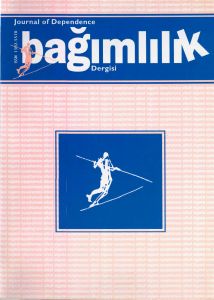Problemli internet kullanımını belirlemede yardımcı bir araç: “internette bilişsel durum ölçeği”nin üniversite öğrencilerinde geçerlik ve güvenirliği
Anahtar Kelimeler:
İnternette Bilişsel Durum Ölçeği- problemli internet kullanımı- geçerlik ve güvenirlikÖz
Amaç: Bu araştırma, 2002 yılında Davis tarafından geliştirilen, problemli internet kullanımını belirlemede yardımcı bir araç olan “İnternette Bilişsel Durum Ölçeği-İBDÖ (Online Cognition Scale-OCS)” nin üniversite öğrencileri örneklemin-de geçerlik ve güvenirliğinin incelenmesi amacıyla yapılmıştır.
Yöntem: Araştırma; metodolojik araştırma yöntemine göre planlanmış ve çalışmaya katılmaya istekli, haftada en az 2 saat internet kullanan 148 üniversite öğrencisi ile gerçekleştirilmiştir. Öğrencilerin %73’ü (n= 108) kadın, %27’si (n=40) erkek olup, grubun yaş ortalaması 21.01 (SS= 1.56) dir.
Araştırmada veri toplama aracı olarak İBDÖ’ nin yanı sıra, Bilgi Formu, UCLA Yalnızlık Ölçeği, Beck Depresyon Ölçeği ve Çok Boyutlu Algılanan Sosyal Destek Ölçeği kullanılmıştır.
Sonuçlar: Ölçeğin test-tekrar test güvenirliği sınamasında, Pearson Momentler Çarpımı Korelasyon Katsayısı toplam ölçek puanları için .90, sosyal destek alt grup puanları için .87, yalnızlık / depresyon alt grup puanları için .76, azalmış dürtü kontrolü alt grup puanları için .89 ve dikkat dağıtma alt grup puanları için .85 olup, p<0.001 düzeyinde anlamlı bulunmuştur. İBDÖ’nin iç tutarlık katsayısı α=.91’ dir ve madde toplam güvenirlik katsayıları .17-.66 arasında değişmektedir. Her bir madde varyansının alt grup puan varyansıyla arasındaki ilişkide ise, değerler .40 ile .73 arasındadır. Benzer ölçeklerle gerçekleştirilen geçerlik sınamasında, İBDÖ ile depresyon ve yalnızlık arasında aynı yönde, algılanan sosyal destek ile ters yönde ilişki bulunmuş, belirlenen faktör yapısının ölçeğin orjinali ile iyi uyum gösterdiği görülmüştür.
Değerlendirme: İBDÖ’ nin geçerlik ve güvenirlik düzeyi, problemli internet kullanımını belirlemede uygun bir yardımcı araç olduğunu göstermektedir.
Referanslar
Baran AG, Burcu E. İnternet kullanımı sosyal ilişkilerimizi nasıl etkiliyor? Sanal sosyal ilişkiler, Sosyal Bilimler ve İnternet Sempozyumu, Ankara, 18 Nisan 2000.
Greenfield D.N. Psychological characteristic of compulsive internet use: A preliminary analysis, 2000 http://www.virtual-addiction. com/internetaddiction.html 14.02.2003.
Cyberatlas Reports,2003 http://www. cyberatlas.com ) 29.08.2003.
Davis R.A. A cognitive-behavioral model of pathological internet use. Comput Human Behav 2001;17 :187-195.
Caplan S.E. Problematic internet use and psychological well-being: development of a theory-based cognitive- behavioral measurement instrument. Comput Human Behav 2002; 18: 553-575.
Souza K,Barbara L. Internet addiction disorder, interpersonal computing and technology. An Electronic Journal for the 21 th Century 1998; 6(1-2).
O’Reilly M. Internet addiction : a new disorder enters the medical lexicon. CMAJ 1996;154: 1882-1883.
O’Reilly M. İnternet addicts can get online help. CMAJ 2000;163:199.
Griffiths M. Internet addiction. Psychologist, 1999; 12:246-251.
Young K. What makes the internet addictive: potential explanations for pathological internet use. 100. Annual Conference of The American Psychological Association, Chicago, 15 August ,1997.
Gönül AS. Patolojik internet kullanımı. Yeni Symposium 2002; 40:105-110.
Davis RA, Flett GL, Besser A. Validation of a new scale for measuring problematic internet use; implications for pre-employment screening. Cyberpsychol Behav 2002;15:331-347.
Morahan-Martin J, Schumacher P. Incidence and correlates of pathological internet use among college students. Comput Human Behav 2000;16: 13-295
Wang W. Internet dependency and psychosocial maturity among college students. Int J Human-Computer Studies 2001;55: 919-938.
Chou C, Hsiao MC. Internet addiction, usage, gratification and pleasure experience: the Taiwan college students’ case. Computers&Education 2000;35: 65-80.
Beard K W, Wolf E M. Modification in the proposed diagnostic criteria for internet addiction.Cyberpsychol Behav 2001;4:377-383.
Kraut R., Kiesler S, Boneva B, Cummings J, Helgeson V, Crawford A. Internet paradox revisited. J Soc Issues 2002;58: 49-74.
Young K, Rodgers R. The relationship between depression and internet addiction. Cyberpsychol Behav 1998;1(1):25-28.
Shapira N.A., Goldsmith T.D., Keck P.E., Khosla UM., McElroy SL. Psychiatric features of individuals with problematic internet use. J Affect Disord 2000;57 : 267-272.
Greenfield D. The nature of internet addiction : psychological factors in compulsive internet use. Presentation at the meeting of American Psychological Association, Boston, Massachussets, 20 August 1999.
Demir A. UCLA yalnızlık ölçeğinin geçerlik ve güvenirliği. Psikoloji Dergisi 1989;7: 14-18.
Hisli N. Beck depresyon envanterinin üniversite öğrencileri için geçerliği, güvenirliği. Psikoloji Dergisi 1989;7: 3-14.
Eker D, Arkar H. Çok boyutlu algılanan sosyal destek ölçeğinin faktör yapısı, geçerlik ve güvenirliği. Türk Psikoloji Dergisi 1995;10: 45-55.
Eker D, Arkar H, Yaldız H. Çok boyutlu algılanan sosyal destek ölçeğinin gözden geçirilmiş formunun faktör yapısı, geçerlik ve güvenirliği. Turk Psikiyatri Derg 2001; 2: 1725.
Petrie H, Gunn D. Internet “addiction”: the effects of sex, age, depression and introversion. The British Psychological Society London Conference, 15 December, 1998.
Ebersole S. uses and gratifications of the web among students, Journal of Computer-Mediated Communication, retrieved January, 2000;6(1) http://www.ascusc.org/ jcmc/vol6/ issue1/ebersole.html. 18.08.2003.
Perry T T., Perry LA., Hosack-Curlin K. Internet use by university students : an interdisiplinary study on three capuses. Internet Res, 1996;8:136-141.
Nie HN, Erbring L. Internet and Society. Standford Instıtute for The quantitative study of society (SIQSS), 2000. http://www. stanford.edu/group/siqss/Press Release/ Preliminary_Report.pdf 10.09.2003.
Young K. Internet Addiction; the emergence of new clinical disorder. Cyberpsychol Behav 1996;1: 237-244.
Young K, Rodgers R. Internet addiction: personality traits associated with its development. 69 th Annual meeting of the Eastern Psychological Association, Philadelphia, April, 1998.
La Rose R, Eastin MS, Gregg J. Reformulating the internet paradox: social cognitive explations of internet use and depression. Journal of Online Behavior 2001; 1(2) http:// www.behavior.net/JOB/v1n1/paradox.html 20.11.2002.
Hamburger YA, Ben-Artzi E. Loneliness and internet use. Comput Human Behav 2003;19: 71-80.
Swickert RJ, Hittner JB, Harris JL. Relationship among internet use, personality and social support . Comput Human Behav 2002;18: 437-451.
İndir
Yayınlanmış
Sayı
Bölüm
Lisans
Telif Hakkı (c) 2025 Bağımlılık Dergisi

Bu çalışma Creative Commons Attribution-NonCommercial-NoDerivatives 4.0 International License ile lisanslanmıştır.
Dergimiz ve bu internet sitesinin tüm içeriği Creative Commons Atıf-GayriTicari-Türetilemez 4.0 Uluslararası (CC BY-NC-ND 4.0) lisansının şartları ile ruhsatlandırılmıştır. Bu durum, Budapeşte açık erişim girişiminin (BOAI) açık erişim tanımı ile uyumludur. Creative Commons Atıf-GayriTicari-Türetilemez Lisansı, kullanıcıların bir makaleyi kopyalamasına, değiştirmeden dağıtmasına ve nakletmesine ve makalenin ticari olmayan mahiyette kullanılmasına imkan tanımaktadır. CC BY-NC-ND 4.0 lisansı, yazarına uygun şekilde atfedildiği sürece açık erişimli bir makalenin ticari olmayan mahiyette kullanılmasına izin vermektedir.

